Process is a comics workshop and discussion group that meets up on the first Wednesday of every month at London’s Gosh! Comics from 7-9 pm. The idea is to have a place where creators and readers can get together and discuss the mechanics of comics, present work in progress and find new collaborators. Each meeting opens with everyone introducing themselves, continues with some more general chat and finishes up with half an hour or so at the end for everyone to mingle and discuss things less formally.
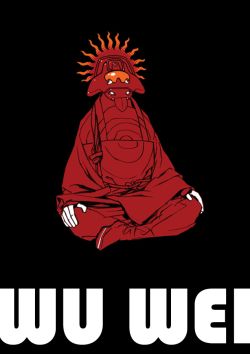 During the introduction this month it became clear that a good number of those attending were currently working on their submissions for ‘Wu Wei’, an anthology of comics on spirituality edited by Mike Medaglia [See Andy Oliver’s ‘Small Pressganged’ interview with Mike Medaglia here at Broken Frontier last week]. These contributors included Andy Poyiadgi, Richy Chandler, Francesca Dare, Tim Hassan, Owen D. Pomery and Steven Walsh. Other attendees included Matt and Mawusi from ‘Let’s Do Comics’, Daniel de Sosa, Sajan Rai, Jeesan Gazi and the team from ‘Backwards Burd’.
During the introduction this month it became clear that a good number of those attending were currently working on their submissions for ‘Wu Wei’, an anthology of comics on spirituality edited by Mike Medaglia [See Andy Oliver’s ‘Small Pressganged’ interview with Mike Medaglia here at Broken Frontier last week]. These contributors included Andy Poyiadgi, Richy Chandler, Francesca Dare, Tim Hassan, Owen D. Pomery and Steven Walsh. Other attendees included Matt and Mawusi from ‘Let’s Do Comics’, Daniel de Sosa, Sajan Rai, Jeesan Gazi and the team from ‘Backwards Burd’.
We opened the discussion by talking about recent shows in London, the MCM Expo and the Alternative Press Fair, that people had either sold at or attended as punters. The guys from ‘Backwards Burd’ shared their experiences at the two shows which lead into a wider discussion on the mechanics of producing and distributing an anthology. We talked about the physical considerations of paper stock and printing methods as well as the more abstract concept of pricing, particularly how difficult it is to price beyond the cost of the actual item and put a value on the work itself. They also invited contributions (of no more than 8 pages please) for their next issue which can be submitted at backwardsburd@gmail.com
The issues with the cost and physical realities of print lead into a suggestion that groups of creators that are operating as separate groups could pool their money to buy paper and pay for printing costs under a co-operative system. Digital was, almost inevitably, proposed as an alternative – with paywalls seen as a way to create revenue – but the consensus from the webcomickers in the room seemed to be that the digital aspect was a great way to publicise their work but that physical copies were the best way to generate income. ‘Backwards Burd’ explained that they used their online edition to showcase a large number of pieces but that they would then select from these for the print edition.
David Lloyd’s ‘Aces Weekly’ project (see video above) was also mentioned and Ket Majmuder presented a very early version of a new web platform for comics called C.A. P.O.W. that he’s currently developing. We then went on to discuss a series of exchanges, largely between James Kochalka and Jim Woodring, from a few years ago on the idea that ‘craft is the enemy’ with the idea of being torn by wanting to be productive while still producing good work.
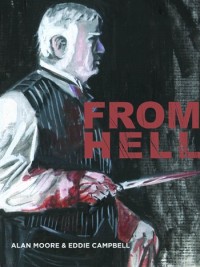 This then led into some talk about the relationship in collaborations between artists and writers with the work of Eddie Campbell and Alan Moore in ‘From Hell’ and Dave Sim and Gerhard in ‘Cerebus The Aardvark’ in particular coming under discussion. Alan Moore’s very particular style of script writing was specifically talked about but this then expanded into a wider conversation on what a writer should give to an artist and what an artist should be left to develop themselves.
This then led into some talk about the relationship in collaborations between artists and writers with the work of Eddie Campbell and Alan Moore in ‘From Hell’ and Dave Sim and Gerhard in ‘Cerebus The Aardvark’ in particular coming under discussion. Alan Moore’s very particular style of script writing was specifically talked about but this then expanded into a wider conversation on what a writer should give to an artist and what an artist should be left to develop themselves.
Dave Sim’s ‘eccentricities’ also came under the spotlight, in terms of his own particular process, his relationship with Gerhard and the ability for a reader to separate the art from the artist. We then broke away from the table for people to be able to have a look at each other’s work and sort out a few new projects, before breaking away from the shop entirely to finish our evening’s ruminations in the John Snow, a local pub named after the man who designed London’s sewers, rather than the Game of Thrones theme pub that a lot of soon-to-be-disappointed comickers expected…
You can follow the Process group here and check out the group’s blog here. And you can visit the Gosh! Comics website here.





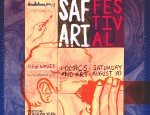

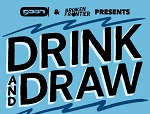

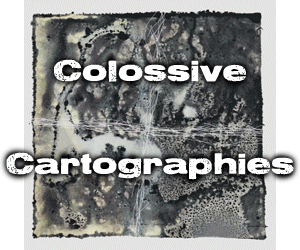

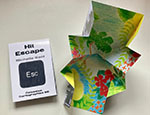


The issues surrounding pricing for small pressers particularly intrigue me here. When I first started buying small press comics 20-odd years ago there was almost a philosophy of creators running at a considerable loss just to get the work out there and in the hands of as many readers as possible. The landscape has changed dramatically now, obviously, with online delivery providing a potential audience unimagined then, and self-publishing having evolved far beyond the photocopied/home-stapled model (though nothing wrong with that route if it’s what people choose!). I favour the approach of those like Richy with LUCY THE OCTOPUS (and Jade Sarson with CAFE SUADA, Zarina Liew with LE MIME and others) of the free webcomic first to garner interest,,, and then the paid print collection coming later.
Pretty much how I feel about it as well, Andy Oliver: the financial risks seem to be much lower these days if you go digital first and print later. And then there’s crowdfunding, which didn’t exist back in the day — well, aside from asking friends and family for support perhaps.
Pretty much how I feel about it as well, Andy Oliver: the financial risks seem to be much lower these days if you go digital first and print later. And then there’s crowdfunding, which didn’t exist back in the day — well, aside from asking friends and family for support perhaps.
What’s also interesting to note is that these days, the photocopied small press book has become a graphic statement choosing the specific effects of that particular technology as a way of distancing themselves from the computer age.
Another shift in tone in small press circles is that the creators are more actively searching for revenue, connecting and sharing with kindred souls any knowledge they obtain during their own ups-and-downs. Which can only improve the scene and the spirit of all involved. I get the impression that up until 10 years ago, small press was more its own island and the internet has dragged them all in a larger communal mindset with webcomics predating print editions enabling them to reach ever larger audiences.
Comics will set you free!
I’m a cartoonist working primarily in the print medium – producing photocopied and stapled zines as the primary format for my work. I’ve got a couple of thoughts arising from the comments I see here.
Firstly in response to Bart’s comments I absolutely agree that my choice is a graphic statement about not only the material qualities of a printed zine, but also its cultural association with DIY arts, punk attitudes, and the taking control of the means of production. It changes how I draw comics, and changes how they’re received. It’s where my heart is. I think that shows.
However, in my case, I’m not doing so to distance myself from the computer age. I use computers to scan, clean up, assemble, print, distribute and market my work. The ‘digital’, or technology, for me is not something outside the process, but intimately bound into the process, if you know what I mean. The pencil is a tool, the computer is a tool. Furthermore, the sociality of making and sharing and printing and talking about work is also woven into technology and computers etc. So although there are points of distinction or departure, they’re all part of the same thing for me.
Community mindedness has definitely, from what I can see, been part of the zine scene/small press scene from the beginning. I think Bart is right to suggest that the Internet has meant that the way in which community is understood and experienced has changed, but ultimately facilitates new ways of communicating and sharing: I’m in no way a big deal, but a lot of the exciting things I’ve been able to achieve – going to TCAF, SPX, having a comic published by Retrofit – were facilitated by my presence on the Internet, especially Twitter. However, just because I shout into the void, doesn’t mean that many people hear. We all know the danger of speaking only to the people who are already listening. How do you grow your audience?
I think we need to be carefully when we say that it is a more financially sustainable venture. Postage costs, table costs and conventions, accommodation costs at non-local conventions, and (again for emphasis) postage costs make turning a profit very, very hard. And remember – this is us talking about the success or otherwise of valuing a product on the cost of its distribution (printing, posting etc.) and not the hours of time that artists put into them. So it is still financially ‘risky’ in many ways. I have a day job that allows me to do all the stuff I do, and I’m very grateful for that.
Also, when we open the can of worms of webcomics leading to a wider audience, we have to ask about two things. The first is how do you build an audience? If you build it they will come? and second, quality if everyone loves it, is it still good? I think that with an increased and more sophisticated use of social media these days, we can address the first question. I think we also have a much more sophisticated audience and readership who can address the second. So I think on the whole, it can be a positive model. But if we all do it, and there’s only so many readers, how do we take a share of their pocket money?
Crowdfunding is not a panacea, either. It is fraught with difficulties around: saturation, marketing, fees, sustainability. We ran a crowd funding scheme to print an anthology, got our money, but made a loss after fees and postage. That was our problem for not planning it properly. However, I wouldn’t feel comfortable going back to the platform to do, for example, the second issue of the anthology. That’s because I think I should’ve done it better first time round, and used the donors money to also front costs for future endeavours.
What else?
Ah digital formats! To return to my earlier post, I actually don’t have anything agains digital comics. I’ve not done any myself, yet, because I need to explore them a bit more. I may be writing for a paper platform right now, but that isn’t precluding me ideologically from also doing digital. I just haven’t worked out how best to do it for my own work and my own artistic practice.
Then, cutting through all of this is the question of medium vs genre. The internet is full of stuff that we call comics. I know a lot of people who make comics. But are we actually making the same thing? Do we have the same audience? Do we use the medium in the same way? I’d say, often, no. I respect and love loads of people in the British comic scene, but we do different work. My stuff isn’t necessarily the same thing as someone else’s. We need a multivalent approach to marketing, building audiences, and selling our work to people outside of an audience that we already have. I love comics conventions, but you’re selling to people who already like comics for the most part. And within that, some of them will like your comics, but others won’t. What about people out there? People who don’t like comics but do like my comics? Will digital solve that, just because it makes it easier to disseminate work?
I hope I don’t sound like a right downer. Just thinking out loud!
Good comments, Simon. Just to clarify, my comment about ‘distancing themselves from the computer age’ was more intended as a general statement to make a distinction between hand made comics and digitally assembled comics. There is stuff out there like the much lauded Windowpane by Joe Kessler that specifically avoids the digital road. But you’re right, the statement was too broad and a tool is a tool is a tool.
What the small press is not helping are indeed the increased postal costs. If you compare prices to even 3 years ago and now, there’s been a huge increase in the costs involved. You’d think that the postal companies would jump unto the increasing package postings that need to be done in this internet shopping age but it seems they are keen to retrieve their losses from postal mail from their package costs.
Marketing is always a tricky thing and the access of mass communication for the general masses does not necessarily mean that people diversify more. I firmly believe that they will diversify more in their own chosen area of interest/hobby but this does not automatically mean that creators can more easily reach a more diversified audience. People are creatures of habit and there’s only so much time in a day that they can spend on their hobbies.
I think I view it much in the same way as I consume music. If there is an artist I am interested in, I’ll seek out a few tracks to download or stream and if I’m still into it, I’ll buy the physical record. Both have their place in different ways for me, though in terms of what I produce, I’m currently all print.
Hilarious… John Snow 🙂
The specific idea that was put forward on the night was a paywall or subscription format for online content.
Given the difficulties that traditional print media with a long-standing audience (newspapers/magazines) have found with this model I don’t see how it’s viable for webcomics.
I think that Simon and Owen’s work in print shows the value of the physical medium.
The decisions they take beyond the content, in terms of production and presentation, are huge factors in my enjoyment of their work and something I would miss if I was reading the comics online.
Yes, I agree the paywall/subscription model is not one that’s viable here. It’s difficult enough as a free “consumer” to keep up with all the great work available online after all.
I’m interested as well in the approach to make physical small press content “matter”, i.e. the emphasis creators are putting in producing material that works as an object and just couldn’t be replicated digitally; where the physicality is part of the overall experience. Tom Humberstone did that with SOLIPSISTIC POP obviously but there are so many artists out there giving their comics a reason to exist physically: Kat Chapman’s beautiful hand-bound books, Lizz Lunney’s multiple format minicomics, Alys Jones’s astonishing BEYOND THE WIRE with its handcut holes allowing the reader to peer through into the following pages… I could go on and on.
Very true Andy. Alys Jones’s book is indeed very special, I’d never seen anything quite like it, with each book having it’s holes cut by hand!
I think Andy’s point about format is correct.
As great as the Internet is for showcasing work and connecting with readers it means also means that you can’t just rely on raw content any more.
Format and presentation allow the creator a chance to develop new ideas, shops to have items that can’t be replicated online and readers to enjoy spectacular products.
I think Chris Ware’s ‘Building Stories’ is a great example of a creator and publisher taking up the challenge and running with it and I’m constantly seeing new Small Press and independent titles that are just beautiful things.